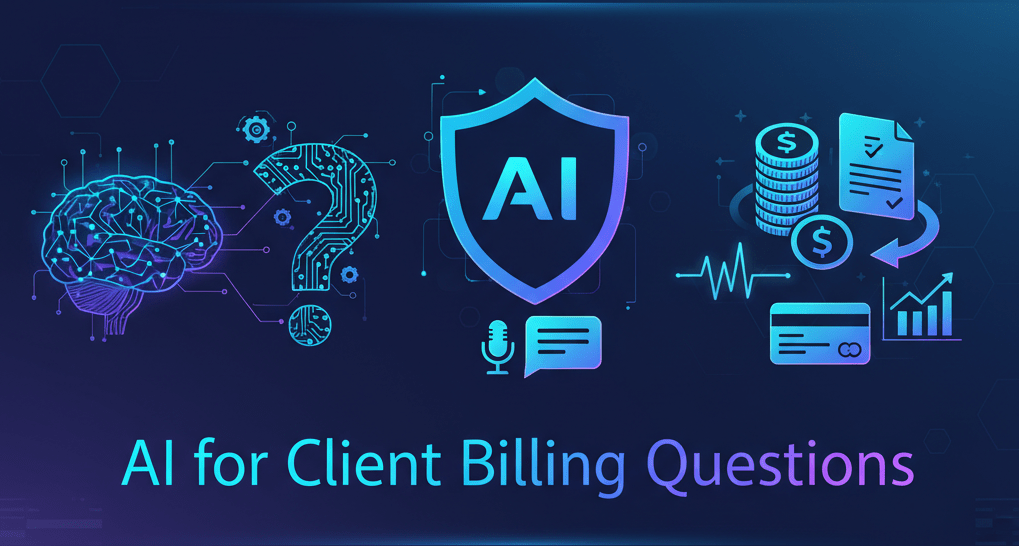“Automate your accounts receivable with AI for Client Billing Questions to instantly answer FAQs 24/7, speed up payments, and free your finance team for collections.”
Imagine your finance team. They are smart, dedicated people. Yet, a significant chunk of their day vanishes into a black hole of repetitive client billing questions. It’s a familiar story for many businesses. Invoices go out, and then the calls and emails flood in. “Can I get a copy of invoice #123?” “What are your payment terms again?” “Where do I update my credit card?” These aren’t complex questions. They’re routine. But they add up. They drain valuable time and resources. They slow down your payment cycle. And they frustrate clients who just want quick answers.
This isn’t just an inconvenience. It’s a significant bottleneck for accounts receivable (AR) teams. It prevents them from focusing on more strategic tasks. Think about it. Your AR team should be working on complex collections, identifying at-risk accounts, and optimizing cash flow. Instead, they are acting as glorified information desks. This needs a solution. A smart one. A modern one.
The good news? A powerful solution exists. It’s called Artificial Intelligence (AI). Specifically, an AI agent. This AI agent can learn your billing policies. It can integrate with your basic client information. It can then provide instant, accurate answers to these common queries. All day. Every day. 24/7. This isn’t science fiction. It’s a practical, implementable strategy. It speeds up payments. It makes clients happier. It frees your AR team.
This article will show you how. We’ll explore the common billing questions that plague businesses. We’ll explain how AI can address these challenges. We’ll discuss the many benefits. And we’ll introduce you to a tool that makes it all possible.

The Daily Grind: Common Billing Questions That Slow Down Your AR Team
Let’s break down the common culprits. These are the questions that endlessly repeat. They clog up phone lines. They fill inboxes. They consume your AR team’s time.
“Can I get a copy of invoice #123?”
This is the most frequent request. Clients misplace invoices. They need them for their own record-keeping. Or for tax purposes. Whatever the reason, sending a copy is a manual task. Someone has to locate the invoice. Then they have to attach it to an email. Or even mail it. This takes time away from other duties. Multiply this by dozens or hundreds of clients. You quickly see the problem.
“What are your payment terms?”
Payment terms are crucial. They dictate when and how clients should pay. But clients forget. Or new employees join their team. They need to know the specifics. Is it net 30? Is there a late fee? What payment methods do you accept? Answering this repeatedly is tedious. Yet it’s vital information for clients.
“Where can I update my credit card information?”
For recurring billing, this is essential. Credit cards expire. Clients get new ones. They need a secure, easy way to update their details. If this process is clunky, payments fail. This leads to more follow-ups. It creates unnecessary delays. It also potentially damages client relationships. Clients want a smooth, secure process.
“Has my payment been received?”
Clients pay invoices. They want confirmation. This is especially true if a payment is slightly late. Or if they used a new method. Checking payment status requires accessing your financial system. Then someone has to confirm the transaction. This is another quick but frequent interruption.
“I have a discrepancy on my bill. Can you explain charge X?”
This is a slightly more complex query. But often, the explanation is straightforward. There may be a pro-rated charge. Or a specific service fee. A human usually needs to look at the details. However, many common discrepancies can be explained with pre-defined answers. If the AI can explain the common ones, it leaves the truly complex issues for your team to address.
“What are my outstanding invoices?”
Clients often want a summary. They need to know everything they owe. This helps them manage their own finances. Providing a quick list of open invoices is a common request. This again involves accessing client-specific data.
“Can I set up a payment plan?”
While not as frequent as others, this is an important question. Especially for larger invoices. Or for clients facing temporary financial difficulties. Providing information on your payment plan options or directing them to the right contact can be automated. This shows flexibility. It helps retain clients.
These are just a few examples. Many other variations exist. Each one, on its own, seems minor. But together, they form a mountain of administrative burden. This mountain slows down your entire AR process. It impacts your cash flow. It affects your client satisfaction.
The AI Advantage: How an AI Agent Transforms Billing Support
Now, let’s look at the game-changer. An AI agent. Imagine this agent as an always-on, super-efficient billing assistant. It never sleeps. It never gets frustrated. It consistently provides accurate information.
What is an AI Agent?
At its core, an AI agent for billing is a specialized chatbot. It uses natural language processing (NLP). This allows it to understand client questions. It then uses a knowledge base. This knowledge base holds all your billing policies. It also connects to your basic client data. This allows it to give personalized answers.
How it Works: The Mechanics of Billing Automation
- Training the AI: The first step is crucial. You “train” the AI. This means feeding it your company’s billing policies. Think of your FAQ documents. Your terms and conditions. Your late payment policies. Your various invoice templates. All this information is stored in the AI’s knowledge base. It learns the nuances of your billing system.
- Integration with Client Data: The AI isn’t just a static knowledge base. It needs to know about your clients. It integrates with your existing systems. This could be your CRM. Your accounting software. Or a dedicated client portal. This integration typically provides read-only access to specific data points. For example, open invoice numbers. Payment statuses. Client names. This allows for personalized responses.
- Client Interaction: A client has a question. They go to your website. Or a dedicated portal. They type their query. The AI agent immediately processes it. It understands the intent. It pulls relevant information from its knowledge base. It also checks client-specific data if needed.
- Instant, Accurate Answers: The AI agent provides an immediate response. No waiting on hold. No email queues. The answer is consistent. It’s accurate. It adheres strictly to your company’s policies.
- Escalation for Complex Issues: Not every question has a simple answer. Some issues are complex. They might require human intervention. The AI is smart enough to recognize its own limitations. When it encounters a question it can’t resolve, it smoothly escalates. It can direct the client to the right human team member. It might even open a support ticket. This ensures that clients always receive help, even for the most challenging problems.
Direct Benefits: Speeding Up Payments and Improving Cash Flow
The impact of this automation is significant. It touches several key areas of your business.
Faster Payment Cycles:
This is the most immediate benefit. Many payment delays happen due to simple questions. Clients can’t find an invoice. They are unaware of the payment terms. They struggle to update payment info. An AI agent removes these obstacles. Clients get answers fast. They can then pay faster. This reduces your Days Sales Outstanding (DSO). It puts cash in your bank account sooner.
Reduced Administrative Burden on AR Teams:
Your AR team spends less time on repetitive tasks. Imagine the time savings. The hours currently spent answering basic questions become free. This time can be redirected. They can focus on proactive collections. They can investigate genuinely complex disputes. They can build stronger client relationships. They can work on improving overall AR efficiency. This means a more strategic, less reactive AR department.
Improved Client Experience and Satisfaction:
Clients want speed and convenience. They don’t want to wait. An AI agent provides 24/7 support. Clients get answers when they need them. This could be after hours. Or on weekends. This convenience leads to higher satisfaction. Happy clients are more likely to pay on time. They are also more likely to remain loyal. This builds goodwill. It strengthens your brand.
Consistent and Accurate Information:
Humans make mistakes. They might misremember a policy. Or give slightly different answers. An AI agent is programmed with your exact policies. It provides consistent, accurate information every single time. This reduces confusion. It avoids potential disputes down the line. It ensures everyone is on the same page.
Cost Savings:
Think about the operational costs. Less time spent by AR staff on routine queries means less overhead. You might even reduce the need to hire additional staff as your business grows. The AI handles the volume. This makes your AR function more scalable. It’s a more efficient use of your resources.
Data Insights:
AI agents collect data. They log every interaction. You can analyze these interactions. What questions are most common? Where do clients struggle? This data is invaluable. It helps you identify recurring issues in your billing process. You can then address these root causes. This leads to continuous improvement.
Beyond the Basics: Expanding AI’s Role in AR
While answering questions is a great starting point, AI can do more. It can proactively assist your AR efforts.
Automated Payment Reminders:
The AI isn’t just reactive. It can be proactive. It can send automated, personalized payment reminders. “Your invoice #123 is due in 3 days.” Or, “Your payment for invoice #456 is past due.” These reminders are gentle. They are effective. They reduce the need for manual follow-up calls. They improve payment timeliness.
Client Self-Service Portal Integration:
An AI agent often complements a self-service portal. Clients log in. They see their invoices. They can make payments. The AI sits alongside this. It acts as a guide. It answers questions about using the portal. It helps clients find what they need. This creates a truly seamless self-service experience.
Personalized Communication:
The AI can learn client preferences. Does a client prefer email? Or text messages? The AI can tailor communication channels. It can also personalize messages. This makes interactions feel less robotic. It feels more human, even though AI drives it.
Fraud Detection (Advanced):
For more advanced systems, AI can even help flag suspicious payment activities. It can analyze patterns. It can identify anomalies. This adds another layer of security to your financial operations. This protects your business.
Professional Services Billing: A Specific Use Case
Professional services firms frequently encounter distinct billing challenges. Lawyers, consultants, marketing agencies. They all bill clients for time and services. Invoices can be complex. They detail many hours. They list various tasks. This complexity often leads to more client questions.
An AI agent is particularly valuable in this context. It can explain specific line items. It can clarify project phases. It can reiterate retainer terms. This transparency builds trust. It reduces disputes. It streamlines the billing process for these specialized firms. Clients understand their bills better. They pay faster.
The Human Element: When AR Teams Are Still Essential
It is essential to understand this. AI does not replace your AR team. It empowers them. It frees them from drudgery. Your AR professionals remain crucial.
They handle the truly complex issues. The unique disputes. The sensitive client conversations. The strategic financial analysis. AI handles repetitive, high-volume tasks. This allows your human team to focus on what humans do best. Critical thinking. Empathy. Negotiation. Relationship building. This creates a powerful synergy. AI handles the routine. Humans handle the strategy and complexity.
Getting Started: Building Your Own AI Billing Assistant
This all sounds great. But how do you actually do it? Many businesses might think, “AI is too complex for us.” “We don’t have data scientists.” “We can’t afford custom development.”
This is where tools like Scalewise.ai come in.
Introducing Scalewise.ai: Your Free, No-Code AI Agent Builder
Scalewise.ai changes the game. It demystifies AI. It makes it accessible. It is a powerful platform. It enables any finance department to create a dedicated billing assistant without requiring a single line of code. And here’s the best part: it’s free to start.
Why Scalewise.ai is a Game Changer for AR Teams:
- No-Code Interface: You don’t need to be a programmer. Scalewise.ai provides an intuitive interface. You configure your AI agent with clicks. You train it with your existing documents. It’s designed for business users.
- Easy Training: Upload Your Billing Policies. Your FAQs. Your terms and conditions. Scalewise.ai’s AI engine learns from your content. It quickly builds a comprehensive knowledge base.
- Seamless Integration: Scalewise.ai is built for integration. It can connect with your existing systems. This ensures your AI agent has access to the client information it needs.
- Customizable Responses: You control the tone. You control the messaging. Your AI agent sounds like your company. It maintains your brand voice.
- Scalability: Start small. Automate answers to the top 5 questions. Then expand. Add more knowledge. Integrate more deeply—scalewise.ai scales with your needs.
- Free to Start: This is a huge advantage. You can experiment. You can build your first billing assistant. You can see the benefits firsthand. All without a major upfront investment. This removes a significant barrier to entry.
How to Build Your AI Billing Assistant with Scalewise.ai (A Simplified Guide):
- Sign Up for Free: Go to Scalewise.ai. Create an account. It’s quick and easy.
- Define Your Agent’s Purpose: Clearly state what your AI agent will do. Focus on billing questions.
- Upload Your Knowledge Base: Gather all your billing-related documents and information. Your FAQs. Your policy manuals. Your invoice templates. Upload them to Scalewise.ai. The AI will ingest this information. It will learn from it.
- Connect to Data (Optional but Recommended): Configure read-only access to relevant client data. This allows the AI to provide personalized answers. For example, “Your outstanding balance is X.”
- Test and Refine: Interact with your AI agent. Ask it all the common questions. See how it responds. Adjust its training. Clarify any ambiguous areas. This iterative process ensures accuracy.
- Deploy: Once satisfied, deploy your AI agent. This could be on your website as a chatbot. Or integrated into your client portal.
It’s a straightforward process. It puts powerful AI capabilities directly into the hands of your finance team.
The Future of AR: Leaner, Smarter, More Client-Centric
The world of finance is changing. Automation is no longer a luxury. It’s a necessity. Especially for repetitive, high-volume tasks. Accounts Receivable stands to gain enormously.
By embracing AI for client billing questions, businesses achieve multiple wins:
- Financial Health: Faster payments. Improved cash flow. Reduced operational costs. These directly impact your bottom line.
- Operational Efficiency: Your AR team becomes more productive. They focus on higher-value activities. They contribute more strategically.
- Client Relationships: Clients appreciate prompt and immediate responses. They value convenience. This builds loyalty. It fosters positive relationships.
This isn’t about replacing humans with machines. It’s about leveraging technology. It’s about empowering humans. It’s about making your AR function smarter. It’s about making it more responsive. It’s about making it more client-centric.
The journey to an automated AR department starts with small steps. Addressing those common billing questions is a perfect first move. And with tools like Scalewise.ai, that first step is easier than ever before.
Don’t let repetitive questions bog down your AR team any longer. Explore the power of AI. Transform your billing process. Improve your cash flow. Make your clients happier. The solution is here. And it’s ready for you to use.
Frequently Asked Questions (FAQs)
Q: What kind of questions can an AI agent answer?
A: An AI agent can answer a wide range of common billing questions. This includes requests for invoice copies. It can explain payment terms. It can instruct clients on how to update their payment methods. It can provide payment status updates. It can even clarify simple invoice discrepancies. Anything that relies on your documented policies or basic client account information is a good candidate.
Q: Is an AI agent secure for handling sensitive client billing information?
A: Yes. Security is paramount. When integrating an AI agent, ensure it adheres to strict data privacy standards. Its access to client data should be read-only for specific, necessary information. Reputable AI platforms prioritize data encryption and adherence to compliance standards. Always verify the security protocols of any AI solution you consider.
Q: Will an AI agent replace my entire accounts receivable team?
A: No, absolutely not. An AI agent is a tool. It handles the repetitive, low-value tasks. This frees up your AR team. They can then focus on more strategic work. This includes complex collections. It provides dispute resolution. It includes building client relationships. The AI complements your team. It doesn’t replace them.
Q: How long does it take to set up an AI billing assistant?
A: With no-code platforms like Scalewise.ai, setup can be surprisingly fast. You can have a basic agent trained and ready in just a few days. Sometimes even hours. The time depends on the volume and organization of your existing knowledge base. It also depends on the complexity of any integrations. Starting with common questions makes it quicker.
Q: What if a client asks a question the AI can’t answer?
A: Good AI agents are designed to recognize their limitations. When a question is too complex or outside its trained knowledge, it will escalate. This means it will direct the client to a human team member. It might provide contact details. Or it might create a support ticket. This ensures clients always get the help they need.
Q: Can the AI send proactive payment reminders?
A: Yes, many AI solutions can do this. Once integrated with your billing system, the AI can track due dates. It can then send automated, personalized reminders. These reminders can go out via email or text. This helps improve payment timeliness. It reduces manual follow-up work.
Q: Do I need technical skills to build an AI billing assistant?
A: Not with no-code platforms. Tools like Scalewise.ai are built for business users. They have intuitive interfaces. You upload documents. You configure settings. You test. No coding knowledge is required. This makes AI accessible to finance teams directly.
Q: How much does an AI billing assistant cost?
A: Costs vary widely. Some platforms offer free tiers to get started. Scalewise.ai, for example, provides a robust free plan. Paid plans depend on features, usage volume, and integrations. Starting free allows you to test the value. Then you can decide on a plan that fits your needs and budget.
Q: Can the AI help clients update their credit card information securely?
A: Yes. The AI can guide clients through a secure process. This often involves directing them to a secure portal. Or it can integrate with a payment gateway. It helps ensure sensitive information is handled safely. The AI itself typically does not store credit card details. It facilitates the secure update process.
Q: What are the main benefits of using AI for client billing questions?
A: The main benefits are numerous. Faster payment cycles. This improves cash flow. Reduced administrative burden on your AR team. Improved client satisfaction through instant, 24/7 support. Consistent and accurate information. Potential cost savings. And valuable data insights to refine your billing processes. It enhances your AR operations, making them more efficient and effective.





